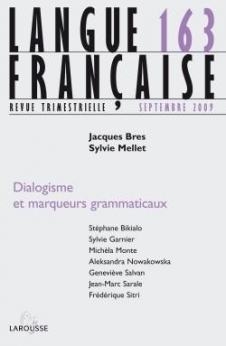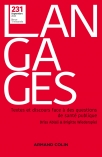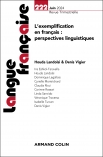
Langue française n° 163 (3/2009)
Pour acheter ce numéro, contactez-nous
Recevez les numéros de l'année en cours et accédez à l'intégralité des articles en ligne.
Le dialogisme a-t-il une place en langue ? Ou, plus exactement, le dialogisme qui – si l’on en croit Bakhtine – ne relève pas de la linguistique, mais de ce qu’il appelle la « translinguistique», est-il un fait purement discursif sans aucun soubassement linguistique, ou a-t-il un support en langue ? L’hypothèse qui sous-tend cette contribution est que le dialogisme, cette présence dans un énoncé d’autres voix porteuses d’énoncés auxquels l’énoncé en cours fait écho, est à ce point inhérent au langage humain qu’il ne saurait reposer sur de simples effets contextuels liés à l’actualisation en discours, mais qu’il doit nécessairement s’appuyer, en amont de la production langagière, sur des opérations énonciatives stables qui ont intégré et formalisé en langue ce processus dialogique 2. Mon objectif sera donc de cerner ces opérations et d’analyser leurs rapports avec le fait dialogique. Car même si le dialogisme est un phénomène très couvrant et polymorphe, son expression et son interprétation sont nécessairement portées par des marqueurs, entendus au sens précis que nous lui avons donné dans l’article introductif de ce numéro.
Sylvie Mellet examines the hypothesis that dialogism is not only a discursive effect of meaning, but that it is also grounded in the language structure. In that respect, the expression of dialogism may be considered as integrated to the grammar itself. She supports this point by studying grammatical elements that are often and strongly associated to the expression of dialogism (concessive adverbials, comparative and conditional subordinate clauses, negation and the French modal verb pouvoir). Her analysis uses the framework of Culioli’s Théorie des Opérations énonciatives and pays a particular attention to the notion of notional alterity : She shows that each of those grammatical elements may be analysed as a scanning operation marker (parcours in French) over the whole notional domain, i.e. over both alternative values p and p’. Thus, by focusing on the enunciative choice between the two propositional values and on the assumption of p rather than p’, the marker outlines the possibility of two assertive utterances, consequently of two enunciators and so, it makes the emergence of dialogism possible, or even necessary.

